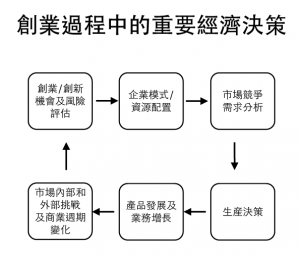全球化和數碼網絡的激增帶來了急速的轉變。從這些改變中, 我們開始看到全球新一代創業家的冒起。他們利用科技去增加生產, 創造新的商業模型, 還為現存的市場 、 工業及財富再分配帶來創新和衝擊。
Given the rapid rate of changes led by globalization and proliferation of digital networks, we have started to see the rise of a new generation of entrepreneurs throughout the world, who have taken advantage of technology to boost productivity levels, create new business models, and bring innovation and disruption to existing markets and industries and even redistribution of wealth.
就價值傳遞而言, 互聯網的新企業如Uber和Airbnb, 挑戰了現存的法律框架和行業人士。 政府一般通過累進稅和社會福利計劃去干預財富再分配。然而, 社會企業家運用新穎的商業模式去重新定義財富再分配。這些商業模式能在超出政府傳統干預的範圍內爲不同社會階級充權。
Internet startups such as Uber and Airbnb have challenged existing legal framework and industry incumbents on how values should be delivered to consumers. Social entrepreneurs have redefined the redistribution of wealth with innovative business models that can empower social classes beyond the traditional intervention by government in income redistribution through progressive taxation and social welfare programs.
因此, 成立創新科技局是香港特別行政區歷史中的重要里程碑。它的到來確立了創新和科技的影響。 兩者不光左右了我們工作和生活的方式, 還改變了我們的學習方法, 特別是對需要計劃學習和規劃職業生涯的學生們尤甚。「香港再度工業化」的口號預示著香港新時代的來臨。通過更多的科技發展和企業創新, 香港將經歷一次關鍵的工業轉型。在這次轉型中, 企業家精神扮演著重要的角色。
Thus, the new Innovation and Technology Bureau marked an important milestone in the history of the HKSAR. Her arrival on the scene has affirmed that innovation and technology have impacted not only the way we work and live but also the way we learn, especially to our students who have to plan for their education and future career path. The slogan on “re-industrialization of Hong Kong” will herald a new period of the Hong Kong SAR in which she will undergo a major industrial transformation through the creation of more technology and innovation based businesses. Entrepreneurship is essential to this transformation.
創業家精神 (在此亦用作開拓與創新精神或簡稱開創精神) 將是經濟學教育的重要課題。它塑造我們的世界, 變更了市場結構跟公司運營和創造財富的方式。作為社會科學的學科, 經濟學提供一個觀點, 讓我們去檢視這些改變。
Entrepreneurship will become an important topic in economic education. It is shaping the world around us, causing changes to market structure and the way how firm operates and wealth is created. Economics as a social science discipline will provide us with a perspective to examine all these changes.
即使身處逆境和面對失敗的高度可能性, 創業家仍對創立和發展公司充滿熱誠。在急速的轉變 及艱鉅的挑戰中, 他會繼續經營公司。創業家會發掘機會、計算風險、獲取資源, 以求把創新引進市場獲利。當然, 這不會是一帆風順的。但是, 創業家背後的信念會讓他堅持不懈。在這個基礎上, 創業家能創造新工作、提升生產力、更平均地分配財富、推動社會經濟進步。這就是可持續的經濟發展。作為經濟學教育工作者, 我們希望能培養學生的創業家精神。我們盼望他們成為足智多謀的人, 懂得分辨危機、堅持熱誠、抓緊機會。
An entrepreneur is a person who has a strong passion to build and grow a business organization despite adversities and the high possibility of failure. He or she would drive the business forward amidst fast changes and difficult challenges in the environment in which opportunities will be recognized, risks calculated, and resources acquired to bring innovation into the market to yield profitable return. Obviously, the journey will not be easy. But the spirit behind the endeavor will make the entrepreneur persevere against all odds. Built upon this basis, new jobs can be created, productivity raised, and wealth more equitably distributed, pushing the economy and society forward. This is what sustainable economic development is all about. As economics educator, we want to nurture our students to develop such spirit. This can transform them into a resourceful person, who knows the risks, seizes the opportunities with a passionate attitude to persevere.
坊間有不同途徑教授創業家精神。在這裡, 我們運用「過程觀」去理解創業及創業家精神。 「過程觀」利用基本經濟學原理去追溯企業的成立及發展。 當中所涉及的概念包括: 分辨機會、分配資源、決定企業類别、解剖市場結構、設定市場切入點、克服市場障礙、定價、區分商品、為成長而創新、處理外部性問題、了解政府政策、及最終能辨識商業周期用以決定注入或凍結資本投資、加速或削減生產量、保留或減少庫存。
There have been various approaches developed to teach entrepreneurship. In our case, we have adopted a “process view” to understand entrepreneurship and the entrepreneurial spirit through the lens of basic economic principles, tracing the formation and development of an entrepreneur from recognizing opportunity to allocating resources, determining type of business organization to dissecting market structure, positioning market entry to overcoming market barrier, pricing and differentiating offerings to innovating for growth, tackling externality to understanding government policies, and finally navigating business cycles to determine the proper time to inject or freeze capital investment, ramp up or cut down production volume, withhold or reduce inventory.
此資源庫旨在給學生闡述這些轉變, 好讓他們能運用經濟學去解釋日常生活, 心存創業家精神,以建立積極主動的態度。總括而言, 學生將可以明白創業家如何審視世界。
The purpose of this resource pack is to equip us to articulate these changes to our students, so that they can apply their knowledge of economics to explain the day-to-day events that happen around them and build up a more proactive attitude with entrepreneurial spirit as the driving force. In short, they can start to see the world through the eyes of an entrepreneur.
扼要 (Major points to recap)
1. 我們身處一個急速轉變和充滿未知的世界。創新和科技導致的波動挑戰了傳統行業、市場 結構和相關的法律框架, 也為價值及財富如何產生和分配的問題帶來新的可能性。
2. 創新和科技將成為香港工業結構轉型的關鍵力量, 而創業家精神尤關重要。
3. 創業家是一個擁有以下特質的人:
● 熱衷於建立及發展商業機構
● 堅持及願意面對逆境和失敗的可能性
● 在未知中發現機會
● 獲取資源
● 為市場帶來創新
● 計算風險以獲利
1. We are living in a rapidly changing and uncertain world in which disruptions caused by innovation and technology have challenged traditional industry and market structures and the legal framework built around them, causing new possibilities of how values and wealth can be created and distributed.
2. Innovation and technology will become important forces to transform Hong Kong’s industrial structure. Entrepreneurship is an essential part of that.
3. An entrepreneur is a person who:
• has a strong passion to build and grow a business organization
• willing to face adversities and the high possibility of failure and persevere
• recognizes opportunities under uncertainties
• acquires resources
• brings innovation into the market
• calculates risks to yield profitable return
企業家精神是發展上述特質的思維及態度。
4. 通過經濟學原理,「過程觀」能描繪創業和創業家精神的形成與發展。它集中應用微觀及宏觀的經濟學理論來描述創業的過程。
Entrepreneurial spirit is the mindset and the attitude of developing the qualities (listed above) of an entrepreneur.
4. A “process view” of entrepreneurship depicts the formation and development of entrepreneurship and entrepreneurship spirit through the understanding of economic principles. It focuses on the application of micro and macro economic principles to describe a chronological sequence of entrepreneurship related events.
問題
1. 創業家是什麼樣的人?
2. 創業家精神是什麼?
3. 我們如何使用「過程觀」去理解創業家精神?
Questions
1. What makes someone an entrepreneur?
2. What is entrepreneurial spirit?
3. What is a “process view” of understanding entrepreneurship and entrepreneurial spirit?
下面是創業者執行經濟決策的過程圖解 (Process View Diagram):
